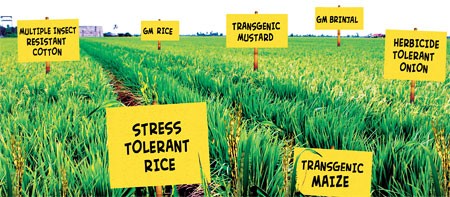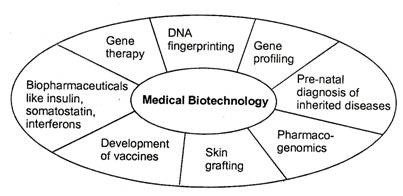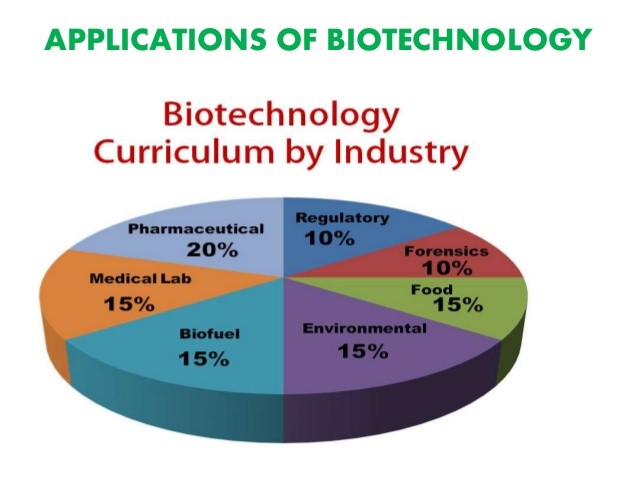| Biotechnology and its Applications Refresher Course |
| Biotechnology and its Applications Concepts Files |
| Biotechnology and its Applications Master Files |
| Biotechnology and its Applications Revision Note |
| Biotechnology and its Applications Note 1 |
| Biotechnology and its Applications Note 2 |
Biotechnology and Its Applications
Table of Content
- Introduction to biotechnology and Its Applications
- Research Areas of Biotechnology
- Applications of Biotechnology
- Role of Biotechnology in Molecular Diagnosis
- Transgenic Animals
- Frequently Asked Questions
Introduction to Biotechnology and Its Applications
We are aware that biotechnology deals with genetically modified organisms like plants, microbes, animals for industrial production of several useful products. Biotechnology is applied in several areas like waste treatment, food processing, diagnostic and therapeutic, bioremediation, energy production and many more.
Research Areas of Biotechnology
- Downstream several processing technologies to eliminate the contaminants from organic/ protein compound.
- The main area of concern is selecting the best catalyst in the form of pure enzyme or microbe.
- Focusing on the creation of best conditions for the catalyst to act in the optimum manner.
Applications of Biotechnology
In Agriculture
Biotechnology has an important role to play in agriculture. It helps in the creation of newer varieties of crop which has been the major area of concern since ages. This field of science allows regeneration of plant material in specific conditions so as to make the crop free from any diseases. It helps in indulging tissue and cell culture to develop reagents that help in diagnosing plant illness. When biotechnology is applied during mutation, it results in genetic diversity, whereby we are able to produce hundreds of varieties of crop of rice, barley, wheat and several other things.
Biotechnology facilitates development of vaccines and antibiotics. Added to this, biotechnology is being extensively used in improving common ornamental plants in particular trees and shrubs. It also contributes in biofuels industry. Enzyme optimization technique and genetic engineering is being used to develop better fuel stocks with more efficiency and capacity. Improving plants and animals via cross pollination, cross breeding and grafting.
Biotechnology also contributes in biofuels industry, in cleansing and fermentation of bio – diesel, bio – oil and bio – ethanol. It helps in developing pesticide – resistant crop, allowing farmers to eliminate selective nearby weeds and not harming the crop.
Following image shows the usage of biotechnology in agriculture in various areas like transgenic mustard, GM brinjal, GM rice, herbicide tolerant onion, etc. –

In Medicines
Biotechnology has an important role to play in medicines as well. Several techniques like recombinant DNA technology and gene therapy helps in diagnosing diseases and forming newer and stronger genes putting back the injured cells. Biotechnology has urbanized biopharmaceutical industry whereby large molecules are used as a good source of proteins. Scientists are using this technology for the treatment of cancer, hepatitis and heart diseases. Genetically – engineered insulin helps in the management of diabetes after regular time intervals.
Biotechnology also contributes in pharmacogenomics and genetic testing. “Pharmacogenomics is an additionally genetically modified method used to learn genetic information of personality.” Genetic testing, on the other hand, is used to recognize criminals and testing of parenthood of the child.
Gene therapy is another area where biotechnology plays an integral role. It is the correction therapy of any heredity disease. It includes several methods that help in the correction of gene defect which are diagnosed in embryo or child. It includes the delivery of normal gene so as to compensate any non – functional gene.
Some of the examples of importance of biotechnology are designing of organisms for the production of antibiotics.
Following figure shows several applications of biotechnology in medicine. It includes gene therapy, DNA fingerprinting, gene profiling, pre – natal diagnosis of inherited diseases, development of vaccines, etc.:

In Environment
Biotechnology contributes in overcoming several environmental pressures like pollution control. Use of genetically modified and engineered cultures helps in pollution abatement. It also includes usage of several bio – treatment technologies like phyto – remediation and bioremediation that helps in effective removal of xenobiotic compounds from gases, solid and aqueous waste. Focus on more and more organic cultivation methods helps in reducing pollution load and simultaneously give the valuable products. Chemical fertilizers are replaced by bio fertilizers and bio pesticides that has helped in reducing environmental hazards.
Biotechnology also focuses on development of bio – plastics that have the capability to replace non-degradable plastics. Thus, it can be said that applications of biotechnology are so broad that every industry is using this technology for betterment.
Following pie chart displays the percentage of biotechnology firms by application, whereby, it is primarily used in medicine and health industry, followed by agriculture, food and beverages, Environment and natural resources, etc.

Role of Biotechnology in Molecular Diagnosis
In order to treat the disease effectively, it is important to diagnose the disease and understand it at the early stage. If we go through the conventional diagnosis method, we are not able to diagnose the disease early. But with the help of biotechnological techniques like Polymerase Chain Reaction (PCR), Recombinant DNA technology and Enzyme Linked Immuno – Sorbent Assay (ELISA) are some of the techniques that help in early diagnosis of diseases. ELISA is based on the interaction of antigen – antibody.
Transgenic Animals
Definition of Transgenic Animals
“Animals that have had their DNA manipulated to possess and express an extra (foreign) gene are known as transgenic animals.” Several animals like rats, sheep, cows, rabbits, fish and pigs are produced via this process.
Importance of Transgenic Animals
- Transgenic animals are specially designed to study the regulation of genes and impact on normal functioning of body along with development.
- The transgenic animals are designed to increase the understanding of contribution of genes in the development of diseases. These basically serve as the model to existing human diseases like Alzheimer, rheumatoid arthritis, cystic fibrosis and cancer.
- Such animal helps in easy development of biological products which are created via introduction of DNA that code for particular product like human proteins (α-1-amtitrypsin). This protein is used to treat emphysema.
- Transgenic mice are produced in order to test the safety of vaccines prior human usage. For example, testing of the safety of polio vaccine was first carried out on transgenic mice.
- Transgenic animals are also used in chemical safety testing for evaluating the toxicity of drugs.
Ethical Issues
Ethical issues refer to the situation in which we need to select the best amongst the various alternatives. Same is the case with biotechnology as well. Biotechnology includes usage of technology and science for altering the characteristics of animals or plants and therefore, transgenic animals raise several ethical issues. Some of these issues are as follows:
- There are several ethical issues of genetically engineered animals as they may result in some danger to human beings followed by the implications to themselves.
- Selective breeding and genetic engineering usually violate animal rights as it involves manipulation of human or animal characteristics.
- Genetic engineering and selective breeding offers several benefits like it helps in improving resistance to diseases and helps in eliminating any characteristics that may cause injury. In spite of several advantages, biotechnology is often considered bad for animals. For instance, pigs currently are bred to grow faster and this may cause discomfort when animals are too active.
- Biotechnology and its experiments on animals are often challenged as animals have to suffer due to new experiments and this give rise to ethical issue.
Frequently Asked Questions
- What is the Green Revolution?
Answer: “The green revolution was the period when productivity of global agriculture increased drastically as a result of new advances.” This period included usage of new chemical fertilizer, synthetic pesticides, herbicides and this helped in increasing the yield.
- Define Genetically Modified Organisms (GMO)? Why genetic modification is in plants important?
Answer: “Plant, bacteria, fungi and animals whose genes are modified or altered via manipulation are called Genetically Modified Organisms (GMO).” GM plants are very useful as –
- Genetic modification helps in making crop more tolerant to abiotic stresses like drought, heat, salt and cold.
- It helps in reducing the dependency on chemical pesticides.
- It reduces post-harvest losses.
- It increases efficiency of mineral usage by plants and improve nutritional value of food.
- It helps in developing tailor – made plants in order to supply alternative resources to industries.
- When was first gene therapy carried out?
Answer: The first gene therapy was carried out in the year 1990 on four years old girl having Adenosine Deaminase (ADA) deficiency. This enzyme is important for the proper functioning of immune system and caused due to the deletion of gene possessing ADA.
- What is biopiracy?
Answer: “Biopiracy is the term used to refer to the use of bio – resources by multinational companies and other organizations without proper authorization from the countries and people concerned with compensatory payment.”